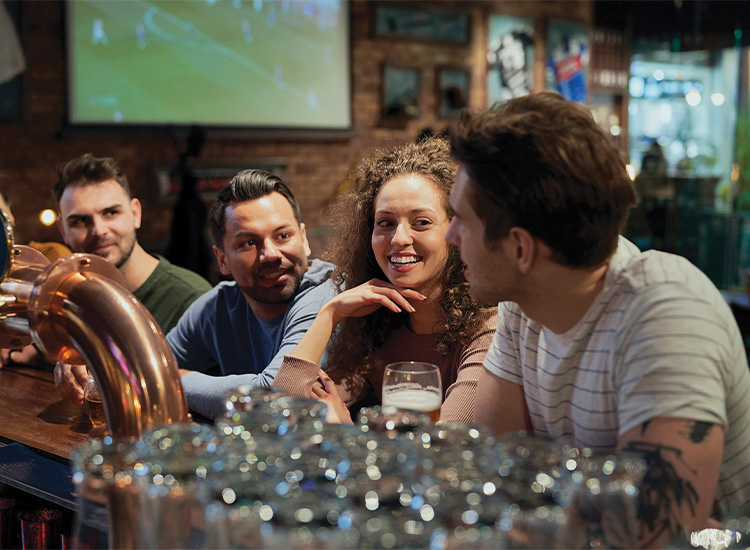There is increased focus from government, police and those working in the night-time economy to improve safety in bars, clubs and restaurants, particularly for women and girls. A new scheme called Licensing SAVI aims to support licensed premises in improving their safety measures.
Safety when socialising – the facts
Personal safety, especially relating to women and girls, rightly remains a high priority for the government and policing. The Office for National Statistics reported in 2021 that 32% of women over the age of 16 had experienced one form of harassment over the last 12 months.
There is a growing groundswell of opinion wanting positive, practical action so that people – particularly women and girls – feel safe when they go out, can relax and enjoy themselves without fear of being attacked or coming to harm.
One fifth of all violence in England and Wales occurs in or around bars or nightclubs and whilst many offences happen in public spaces, initial contact often happens in and around licensed premises.
A 2021 YouGov survey found that many people now feel significantly less safe in licensed premises than they did prior to the first national lockdown in March 2020. The survey revealed that:
- Three out of four adults are calling for improved safety procedures in bars, pubs and nightclubs.
- Across all licensed premises, the support for improved safety in venues is greatest amongst women. In nightclubs, 83% of women want improved safety, in bars and pubs 81% of women want safety improvements, and in restaurants, 64% of women want safety improvements.
- A police safety award may benefit all the different types of licensed premises to some extent, with 25% of adults reporting being more likely to visit bars and pubs that had received such an award.
There is a tremendous consistency in these results, which shows how important safety has become today for men and women – but particularly women. The results send the clearest possible message to the hospitality sector that customers want licensed venues to improve the safety of their premises.
Working in partnership to improve safety
There is growing evidence that the best way to keep bars, pubs and clubs safe for staff and customers is to bring together key organisations such as licensees, venue managers, the police and local authorities to share their expertise.
Evidence also shows that effective delivery of multi-component programmes in drinking environments can reduce alcohol-related harm and consequently costs to health services, criminal justice agencies and a range of other public services.
Introducing the Licensing SAVI initiative
Developed at the request of the Home Office, the Licensing SAVI initiative supports the alcohol drinks industry and is backed by the National Police Chiefs’ Council. It is a self-assessment tool designed to help the owners and operators of licensed premises provide a safe and secure environment. It evolved following significant input from UK government security experts and licensing professionals.
Launched at the start of the year, Licensing SAVI provides the most comprehensive, single source of information. This supports licensees to meet the requirements of police and council licensing teams and comply with the Licensing Act 2003.
Licensing SAVI provides definitive information on effective management practices and operational security as well as some practical safety measures, many of which can be introduced quickly and at little cost. It provides personalised advice and recommendations, to assist premises to comply with the Licensing Act 2003. One licensee said: “I found using Licensing SAVI was a great way of refreshing my security plans, educating my staff, and was particularly impressed with how easy the self-assessment was to use.”
Critical issues covered include responsible drinking, drugs misuse, violent behaviour and safeguarding vulnerable customers, through to opportunist theft and physical venue security. It includes procedures such as pre-employment checks, age verification, managing unplanned large queues and customer searches through to ejecting badly behaving customers and dispersal arrangements when everyone leaves at the same time.
A venue’s use of Licensing SAVI will contribute to the safety of women at night by providing managers and staff with a greater awareness around identifying customers who may be vulnerable and at risk of harm. For example, by introducing the Ask for Angela Campaign, it helps understanding of vulnerability, how to identify it and what mitigating measures and reporting processes can be implemented to reduce vulnerability.
One licensee reports: “I’d not previously heard of the Ask for Angela campaign; however, I was able to print off posters and provide my staff with the input around recognising and dealing with vulnerability. This turned out to be timely as about three weeks ago, a woman in distress approached my door staff and asked for Angela. We were able to take her to a safe space within our club and support her, ensuring she was able to contact trusted friends and get home safely. Without completing Licensing SAVI we may not have been aware of this great initiative.”
The use of Licensing SAVI by venues will raise awareness of security and associated crime prevention, thus reducing vulnerability, crime and associated demand within licensed premises. To date, around 300 licensed premises across the country have undertaken the Licensing SAVI assessment, with feedback from licensees being positive. A licensee said recently: “Licensing SAVI provides a useful single source of information and the opportunity to constantly review and improve safety and security to even higher standards year on year – with an award to show the efforts we have made to provide a safe venue.”
For further information on Licensing SAVI, visit www.licensingsavi.com.
Mark Morgan
PCPI www.policecpi.com


